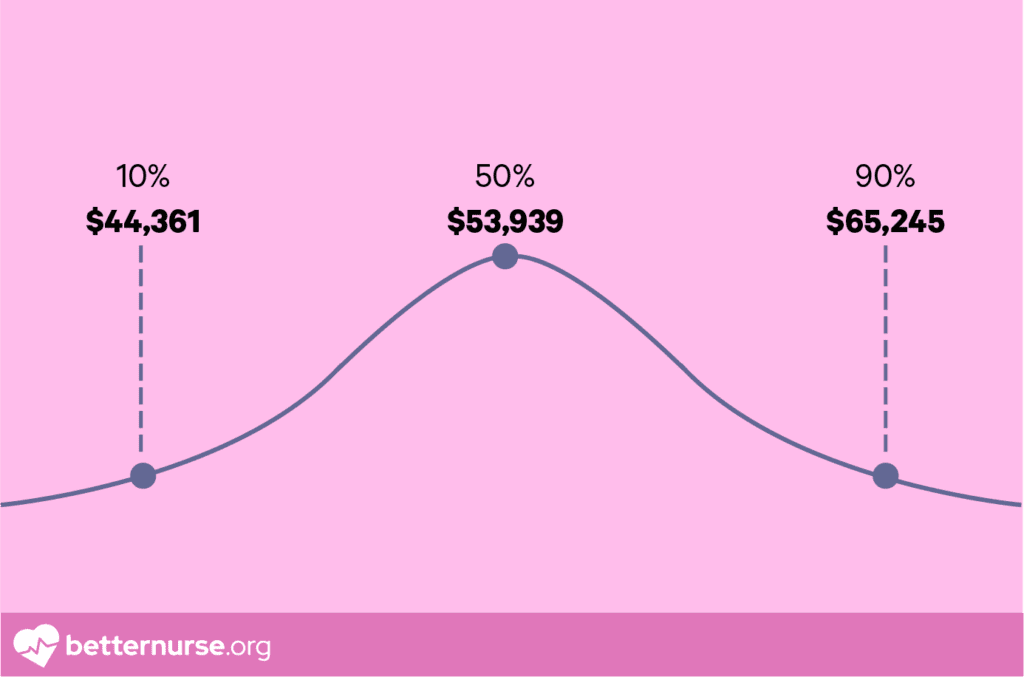The salary of veterinary nurses is not fixed and is impacted by various factors, such as work experience, educational background, geographic location, and type of employer. In the U.S., the average annual income for vet nurses ranges from $44,000 to $65,000.
Veterinary nurses, also known as vet techs, play an important role in the daily operations of veterinary hospitals and clinics. Even though this profession is quite rewarding, it’s essential to understand the financial aspect of working as a vet nurse.
In this guide, we’ll explore the factors affecting vet nurse earnings and go through the benefits that come with the job. So, let’s dive in and learn more about vet nurse salaries and benefits.
Table of contents
Takeaway
Veterinary nurses are like the sturdy foundation of a building that supports the entire structure, ensuring that it stands strong and stable. Just as a foundation is often unseen, vet nurses may not always be in the limelight, but their invaluable contributions underpin the thriving operations of a veterinary clinic, making them indispensable to its success.
What Is a Vet Nurse?
Veterinary nurses are trained professionals who work together with veterinarians to ensure that animals receive the care needed to lead healthy and happy lives. Their primary responsibilities include:
- Assisting with animal examinations
- Conducting diagnostic tests
- Administering medications
- Performing basic wound care
- Monitoring vital signs
- Assisting with surgeries
Also, vet nurses are responsible for instructing pet owners on the correct methods of animal care, including how to administer medications at home, establish feeding schedules, and meet exercise requirements.
They are employed in diverse settings, including veterinary clinics, animal hospitals, research facilities, and zoos. Depending on their professional interests and training, vet nurses can specialize in areas such as emergency care, anesthesia, dentistry, or surgery.
To excel in their profession, vet nurses must possess the ability to function in a fast-paced, frequently demanding environment and provide comfort and support to both animals and their owners during times of stress and difficulty.
Vet Nurse Salary

The field of veterinary nursing offers competitive salaries and opportunities for advancement and specialization within the profession. As of May 2023, the average wage for veterinary nurses in the U.S. is $53,939. The lowest 10% of earners in this field make approximately $44,361, while the highest 10% can earn up to $65,245.
Factors Affecting Vet Nurse Salary
The salary of a vet nurse can vary depending on several factors, including:
- Location: The location of the veterinary clinic or hospital can significantly impact a vet nurse’s salary. Salaries usually tend to be higher in urban areas and lower in rural areas.
- Experience: A vet nurse’s level of experience can also affect their salary. Generally, those with more experience and expertise can earn higher wages.
- Education and certifications: A certificate, such as a Veterinary Technician Specialist (VTS) certification, can increase a vet nurse’s earning potential. In addition, pursuing advanced degrees can also lead to higher salaries.
- Type of employer: The nature of the employing organization can have a modest impact on a veterinary nurse’s compensation. Generally, private practices tend to provide lower salaries compared to specialty clinics or research institutions, which often offer more competitive pay.
- Job responsibilities: A vet nurse’s specific duties and responsibilities can also affect their salary. Vet nurses who perform more advanced tasks, such as anesthesia monitoring or surgical assistance, may earn higher salaries.
- Demand for vet nurses: The need for vet nurses in a particular area can also impact their salary. In areas with a higher demand for skilled vet nurses, salaries tend to be higher.
By understanding these factors, vet nurses can make the right decisions about their career path and salary expectations.
Benefits and Allowances
Being a veterinary nurse comes with a variety of benefits, both tangible and intangible. These may vary depending on the country, the specific workplace, and the individual’s level of experience. Here are some potential benefits and allowances:
- Competitive salary: Depending on the region and the level of experience, veterinary nurses can earn a competitive salary compared to other professions with similar education requirements.
- Healthcare: Some veterinary clinics and hospitals provide healthcare benefits, including medical, dental, and vision insurance.
- Paid leave: This can include vacation, sick leave, and sometimes even paid time off for continuing education.
- Retirement plans: Some employers offer retirement benefits such as 401(k) or similar programs in other countries.
- Continuing education allowance: Some veterinary practices will cover the costs of further training or education to help their employees stay current in the field.
- Discounted veterinary care: Many clinics offer reduced-cost or even free care for their employees’ pets.
- Uniform allowance: Some practices provide an allowance for uniforms or scrubs.
- Professional liability insurance: Some employers cover the cost of professional liability insurance.
In terms of intangible benefits, veterinary nurses often derive a great deal of personal satisfaction from their work. They get to help animals and their owners on a daily basis, which can be deeply rewarding for people who love animals. They also have the opportunity to continuously learn and grow in their profession.
It’s important to note that the specific benefits and allowances can vary greatly from one employer to another. It’s always a good idea to ask about these during the job interview process.
How To Become a Vet Nurse

Becoming a veterinary nurse requires commitment, dedication, and a desire to help animals and their owners through exceptional care. So, if you aspire to become a veterinary nurse, you must follow several steps to achieve your goal.
The first step is to complete a veterinary nursing program that is accredited by the American Veterinary Medical Association. These programs take two to four years to complete and provide comprehensive training in animal anatomy, pharmacology, nutrition, and disease management. After completing the program, you must pass the Veterinary Technician National Exam (VTNE) to become a certified veterinary nurse.
Once you have your certification, the next step is to gain practical experience by working in a veterinary clinic or hospital. This can include performing tasks like
- Administering medications
- Conducting lab tests
- Assisting with surgeries
- Providing nursing care to animals
Many veterinary nurses also choose to specialize in a particular area of veterinary medicine, such as anesthesia, dentistry, or critical care. Specialization typically involves additional training and education beyond the basic veterinary nursing program.
The Bottom Line
In conclusion, a vet nurse’s salary varies based on factors like location, experience, and qualifications. But remember, this career is about more than just the paycheck — it’s about the rewarding experience of caring for animals. So, if you’re passionate about animal welfare, consider taking the next step and exploring this gratifying profession today.

Nurse Luke is a CRNA who specializes in Nursing content and still enjoys a very busy career with Locum, Per Diem and Travel nursing in the greater midwest. He has over 25 years of experience in the healthcare field and received his CRNA masters degree from the Mayo Clinic School of Healthcare. He is passionate about helping nurses explore the options of becoming a travel nurse as well as spending time with his Family.



